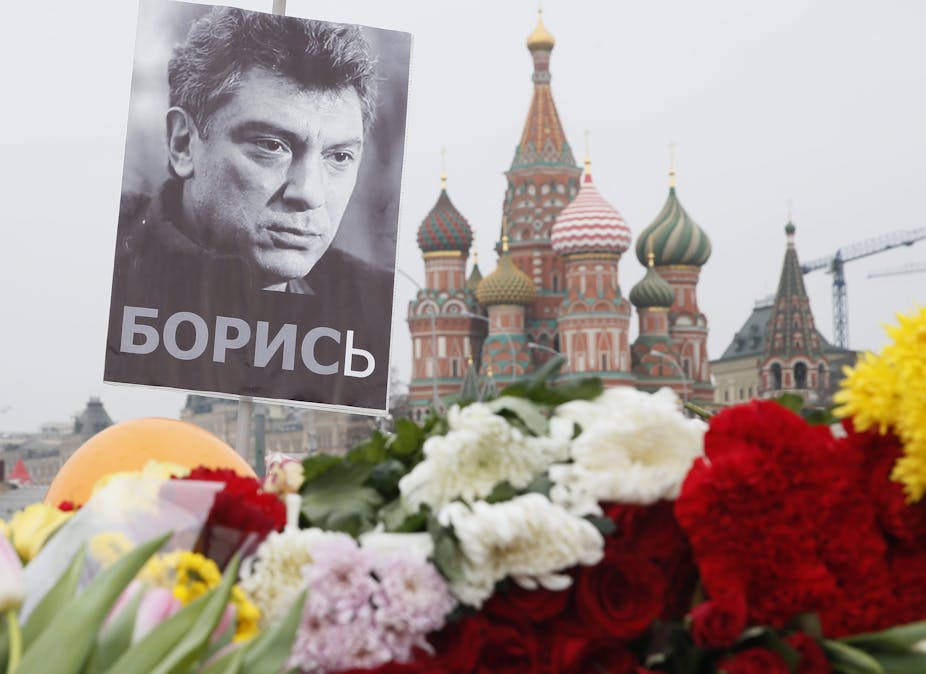Following Russian opposition leader Boris Nemtsov’s assassination, various Russian media outlets supporting the government characterised him - as if reading from a script - as a rather insignificant politician.
But as international media coverage of thousands attending his funeral attest, the opposite is true. Nemtsov, a pro-market and pro-democracy campaigner, was one of the most prominent outspoken and charismatic critics of Putin’s regime.
Born in Sochi in 1959, and educated in Nizhniy Novgorod as a physicist, Boris Nemtsov entered his professional life as a promising early career researcher, publishing more than 60 academic well-regarded papers.
But he came to a political prominence in the late 1980s during Gorbachev’s time, as an environmental campaigner in Nizhniy Novgorod, Russia’s fifth largest city and an important administrative and transportation hub. Remarkably, the campaign was initiated by Boris’ mother, a medical practitioner, who noted abnormal illness and premature death statistics in the region.
In 1991 Boris was elected a member of the first quasi-democratic parliament of Russian Federation, representing Nizhniy Novgorod. There he became known to President Boris Yeltsin, and was initially appointed and then elected as the Governor of Nizhniy Novgorod region, becoming a member of the Federation Cancel – the upper chamber of the Parliament of Russia.
Then only in his 30s, Boris gained a reputation as an honest provincial governor in the country transitioning to a market economy. He converted Nizhniy Novgorod, closed to foreigners in the Soviet time (Remember Andrei Sakharov was in exile there), into an open city with an international airport. He promoted entrepreneurship. One of his important projects was restoring the historic Nizhniy Novgorod Fair, making it an attractive modern trading place. He also initiated social programs, in particular, social housing.
But perhaps his main achievement was land reform. Long before any legal framework for land property rights was established at the federal level, he managed to make visible progress towards efficient market-based farming replacing the counter-productive collective farm system.
Yeltsin moved him to Moscow and made him First Deputy Prime Minister (the youngest person to gain this position). Initially, Nemtsov’s career flourished, with oversight of important portfolios of fuel, energy, railway transport, anti-monopoly policies and infrastructure. In 1997, Nemtsov was pushed to nominate for presidential elections, although eventually he decided not to run.
But inevitably, Nemtsov was unable to negotiate the corrupted government bureaucracy, Russia’s emerging corporate oligarchs, and the old-style management of public infrastructure. The reform agenda stalled, and his popularity plummeted.
After Nemtsov’s dismissal from the government in 1999 and until his death he became one of the leaders of right pro-market and pro-democracy forces trying to reincarnate the losing popularity democratic movement. He gradually became one of the most active and outspoken critics of Putin’s regime.
In 2008 Nemtsov (with his co-author Vladimir Milov), analysing the first two Putin’s terms as President, concluded that the open corruption of oligarchs who took advantage of economic reforms in early 1990s was replaced, under Putin, with the theft of billions of dollars by the bureaucracy, covered up through multi-step transactions to foreign accounts of trusted beneficiaries. They were especially critical of Kremlin-controlled mass media, where mentioning corruption, especially at the highest levels of power, became taboo.
Two years later the two men published an analytical report, supported by solid socio-economic data, charging Putin’s regime, particularly its corruption, with Russia’s decline. They convincingly proved that the country had been dying out demographically; the environment was in catastrophic state; the economy, excluding the natural resource sector had been sliding down; the upgrade of infrastructure had nearly stopped; while inequality dramatically increased; and the social programs, such as housing and age pension system, collapsed. They concluded that “de-putinisation” was the only way out of the dead end Russia was in.
The authorities responded by trying to intimidate Nemtsov, detaining him in December 2010 for his participation in a non-authorised rally.
Most recently, Nemtsov openly supported the democratic revolution in Ukraine, condemned Russia’s annexation of Crimea and its role in the war in the South East of the country. That appeared to be too much for whoever is responsible for his death.

